My time at the Kruger Conservation project in South Africa
Project & Pod News / 30 November 2017
I recently had the opportunity to visit our Kruger Conservation project in South Africa. I joined the team for a few days and the fantastic sightings, beautiful location and extremely friendly and knowledgeable guides made my stay incredible.
The project is based in the Greater Kruger National park and volunteers stay in an open camp close to the Balule River. Travelling to the camp is an adventure in itself – driving from the airport deep into the bushveld was an opportunity to get a feel of where we were staying. We saw elephant, giraffe and and a lot of zebra on the way in and it was impossible not to get excited about the conservation work to come.
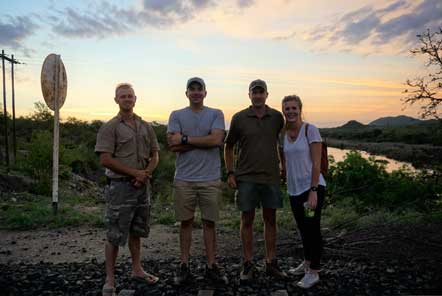
When volunteers arrive at the project they receive an introduction to the camp and the surrounding area. Throughout the first week they will have Bush Craft training concentrating on animal behaviour, orientation and navigation as well as basic bush skills. We went over many of these things on my first day and the guides help volunteers to develop these skills throughout their time on the project. The guides are extremely knowledgeable and their passion for ecology and conservation is infectious!
After our initial training, my first day kicked off with an activity that helps to track the migratory patterns of predators in the area. This involves a game drive to check 11 camera traps in the park. The cameras have motion sensors so a lot can be picked up if there is traffic in the area. Taking so many photos can drain them of battery life and so that nothing is missed, batteries must be changed and data recorded as often as possible. It takes around 3 hours of driving to visit all of the cameras and although we’re hard at work, it’s a great opportunity to see the reserve and its animals!
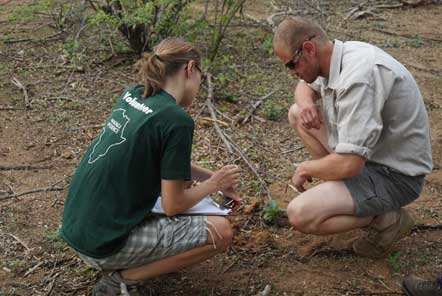
Once we’re back at the camp, we take a look at the photos and record the data so that the migratory patterns of each species can be tracked. This is a great opportunity to get an idea of the animals surrounding us. We see images of warthog, cheetah and even a lioness and her cubs. It’s exciting to think we could have been moments away from crossing paths with these animals!
As we reach midday the heat means that we take things slowly for a few hours. The team has a long lunch, relaxing by the pool or reading a book by the river before we get stuck into the second drive of the day.
In preparation for our afternoon’s activity, our guide, Quinton, leads a lecture on bird identification. Tracking the species diversity and population densities of birds is a simple method of measuring the health of the ecosystem. This information helps rangers and land owners to develop conservation plans for the reserve. The lecture itself was quite complex as much of the information was completely new to me and I was a little worried about identifying birds by their calls alone! However after an hour or so in the classroom, listening to calls over and over, I was feeling more confident and we went out on our second game drive of the day.
For this activity, volunteers visit 5 different locations around the reserve. At each stop the group stand in a circle looking outwards and listen for bird calls for 10 minutes. During this time you take a note of the birds that you can see and hear. While this is hard on your first day, other volunteers reassured me that it does get much easier with time!
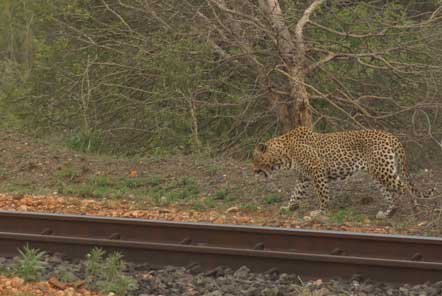
On our way home for the day, we are lucky enough to see a leopard! Leopards are extremely shy creatures and so can be hard to spot. Whilst looking in the opposite direction at a towering giraffe, another volunteer noticed a leopard slinking by ahead of us. We can see an impala in the far distance and the leopard is on its way to make a kill. We are extremely lucky to have seen this and we all head back to camp elated and looking forward to telling the rest of the group at our braai (BBQ) dinner.
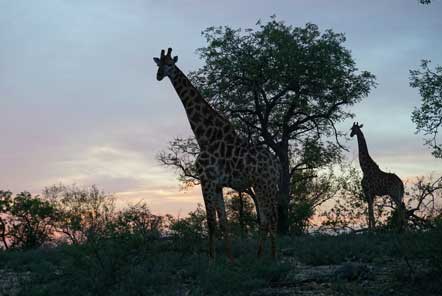
The project is very remote and so evenings are spent around the fire with the rest of the team, watching a movie, playing a board game or having an early night with a book. It’s a stark contrast to life back at home, and a welcome change and great opportunity to soak up the sounds of the park at night. We end our day sat by the fire with the sounds of hyenas cackling and lions roaring in the distance eagerly awaiting tomorrow’s game drives!
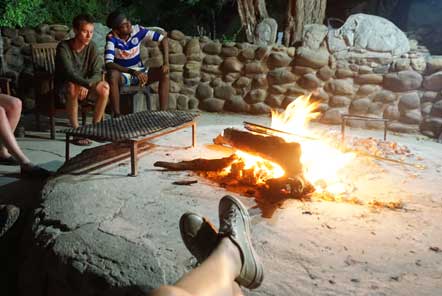
If you are interested in joining this project you can find out more here.
You can apply now here.







